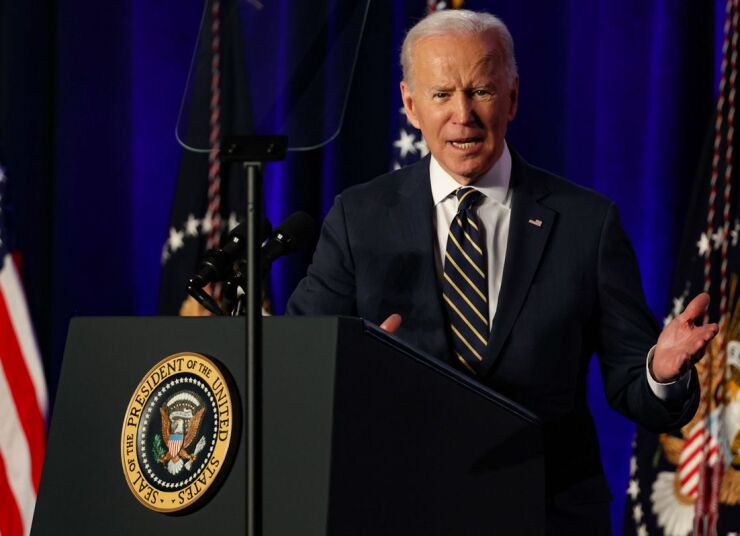President Biden’s proposed budget includes $3.2 billion for state and local governments to use for discretionary spending.
The proposed FY 2023 budget, released on Monday, includes a number of other increases in spending that may not come to fruition in the final budget as Congress is not bound to follow the White House's lead. But what is shaping up to be one of the most controversial aspects of Biden’s proposed budget is a new minimum tax dubbed the “Billionaires Minimum Income Tax."
Biden also included significant increases for states and local governments to add to their police force, a move that distances him from the defund-the-police movement that emerged in 2020.

“The Budget provides $3.2 billion in discretionary resources for State and local grants, and $30 billion in mandatory resources to support law enforcement, crime prevention, and community violence intervention, including putting more officers for community policing on the beat across the Nation,” the budget document said.
But the budget includes the roll out of other programs that were authorized under the Bipartisan Infrastructure Law, including $230 million for the Port Infrastructure Development Program, which helps strengthen maritime freight capacity, in addition to $1.7 billion for the Harbor Maintenance Trust Fund “to facilitate safe, reliable and environmentally sustainable navigation at the Nation’s coastal ports,” the proposed budget sheet said.
The Bipartisan Infrastructure Law also authorized National Infrastructure Investments grant programs, which are slated to receive $4 billion in the proposed budget to support transportation projects. These grants are intended to fund transportation projects that “reduce commute times, improve safety, reduce freight bottlenecks, better connect communities and reduce transportation-related greenhouse gas emissions,” the fact sheet said.
The Federal-aid Highway program to help improve roads and bridges would receive $68.9 billion, which includes $9.4 billion outlined in the Bipartisan Infrastructure Law, $8 billion for rebuilding bridges and $1.4 billion for deploying a nationwide network of public accessible electric vehicle chargers.
The provision also includes $1.3 billion for a new carbon reduction grant program and $1.7 billion for a new resiliency grant program that would update surface transportation infrastructure in the face of climate change.
The Biden administration has also significantly increased the amount allocated to the rail industry, allocating $17.9 billion, a $15 billion increase over the 2021 level.
The budget proposes $50 billion for housing construction and supply. “This includes funding, via the Department of Housing and Urban Development, for state and local housing finance agencies and their partners to provide grants, revolving loan funds, and other streamlined financing tools to boost housing supply, with a particular focus on housing types that have traditionally been difficult to finance using existing Federal financing but have the potential to boost supply and density in supply-constrained communities,” the budget sheet said.
The provision also includes grants that advance and reward state and local jurisdictions efforts to remove barriers to the development of affordable housing, as well as $10 billion modifications to the Low-Income Housing Tax Credit to incentivize new unit production and $5 billion in funding for the Department of the Treasury’s Community Development Financial Institutions Fund.
“The budget also provides more than $1.9 billion in discretionary funding for the HOME Investment Partnerships Program to construct and rehabilitate affordable rental housing and provide homeownership opportunities—the highest funding level for HOME in nearly 15 years,” the fact sheet said.
The budget also continued the Biden administration’s response to the COVID-19 pandemic, with $81.7 billion invested in the Department of Health and Human Services over the next five years and $9.9 billion allocated to build capacity at the CDC and state and local levels.
Schools are also a significant benefactor in President Biden’s agenda. Title 1 received $36.5 billion through a combination of discretionary and mandatory funding, more than double the 2021 enacted level.
It also increases support for disability programs, providing a $3.3 billion increase in IDEA Grants to States, its largest two year increase ever.
The "billionaires" tax proposal, while eye-catching, is unlikely to make major waves in the muni market.
“This minimum tax would apply only to the wealthiest 0.01 percent of households—those with more than $100 million—and over half the revenue would come from billionaires alone. It would ensure that, in any given year, they pay at least 20 percent of their total income in Federal income taxes,” the fact sheet said.
While not mentioning the billionaires tax specifically, Charles Seville, senior director and co-head of Americas Sovereign Ratings at Fitch Ratings remarked that “many of the policy measures included in the budget remain unlikely to be passed," and even if the tax did pass, the effect on the muni industry or to municipal bond investors would be very minimal.
“I don't think it's much of a consequence,” said Steve Rosenthal, senior fellow at the Urban-Brookings Tax Policy Center. “Sometimes [tax proposals] throw people in a higher bracket, where they buy more municipal bonds and municipal bonds go up because the exemptions are more valuable for people who are in a higher bracket,” he added. “But this is not putting people in a higher bracket.”
But as with recent efforts to pass Biden’s Build Back Better package, the decision of whether this provision will stay or not in the final budget may rest again with Senators Joe Manchin and Kyrsten Sinema. The two Democrats, hailing from West Virginia and Arizona respectively, are considered more fiscally conservative than their colleagues and have opposed some of the spending Biden has pushed for.
“It all turns on what Manchin and Sinema want to do and presumably the White House is negotiating with Manchin and Sinema as people speak,” Rosenthal said.





